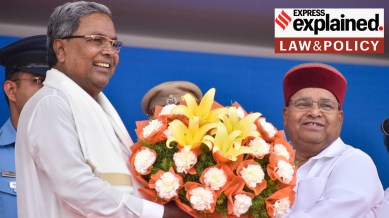Why Karnataka HC allowed investigation against CM Siddaramaiah in alleged MUDA scam case
The facts of the alleged MUDA scam case would “undoubtedly” require investigation and the alleged beneficiary in the family of Chief Minister Siddaramaiah, the court held.

The Karnataka High Court allowed an investigation into Chief Minister Siddaramaiah in the alleged Mysore Urban Development Authority (MUDA) scam on Tuesday (September 24). In doing so, it upheld Karnataka Governor Thawarchand Gehlot’s earlier decision to sanction the investigation.
Under the law, the governor is typically bound by the aid and advice of the Council of Ministers in a state. However, the court held that this was a case where “exceptional circumstances” justified the decision to sanction.
monthly limit of free stories.
with an Express account.
What was the case and why did the CM challenge the governor’s sanction? We explain.
What was the MUDA scam case?
In July, three anti-corruption activists — T J Abraham, Snehamayi Krishna, and Pradeep Kumar — approached the governor for sanction to file complaints against Siddaramaiah. They alleged that his wife Parvathi received 14 housing sites from MUDA in exchange for a 3.16-acre plot of land that MUDA illegally acquired in 2021 during the previous BJP-led government’s tenure. This allegedly resulted in a Rs. 55.80 crore loss for the state.
Karnataka Governor Thawarchand Gehlot issued a show cause notice on July 26 to the Chief Minister. Though Karnataka’s Council of Ministers passed a resolution “strongly advising” the Governor to withdraw the notice on August 1, the governor sanctioned the proceedings against Siddaramaiah under the Prevention of Corruption Act, 1988, and the Bharatiya Nyaya Sanhita, 2023, on August 16.
This sanction is necessary to investigate and prosecute public officials for offences under the PCA. The provision deals with investigation of offences related to public servants, allegedly committed during the “discharge of official functions or duties”.
To investigate any such offence, the police officer must receive the “previous approval” of the “authority competent to remove” the public official from office, or the Central or state government, depending on where the public official is employed.
What were the grounds for Siddaramaiah’s challenge?
The Chief Minister challenged this sanction on August 19 and the Karnataka HC placed an embargo on the trial against him. Representing the CM, Senior Advocate Dr A M Singhvi argued that the Governor of a state is bound by the aid and advice of the Council of Ministers, including the August 1 resolution. Instead, he argued that the “friendly” Governor gave sanction without justifying why the allegations required an investigation or trial.
He argued that the Governor “cannot assume the advice of the cabinet of ministers is biased and assume discretionary powers” and “must explain orders that the cabinet decision suffers from manifest irrationality”.
The governor’s side relied on a 2004 Supreme Court precedent in Madhya Pradesh Special Police Establishment v. State of Madhya Pradesh. Here, the court held that the governor could provide sanction if the material on record shows a prima facie (at face value) case against the public official.
In this case, though the Council of Ministers did not provide sanction and the court acknowledged that the governor is typically bound by its aid and advice, it held that “the Council of Ministers was ex facie irrational whereas the decision of the Governor was not” and affirmed the governor’s sanction.
What did the court decide?
A major issue the court was to examine centred around Section 17A of the PCA. It specifically deals with the procedure when the police seek sanction to conduct an inquiry. This led to the question of whether sanction for prosecution can be given when a private person is a complainant, like in the current case.
Justice M Nagaprasanna presented the summary of the court’s findings, holding that the PCA does not require only a police officer to seek approval to investigate a public official. In fact, it is the “duty” of a complainant to seek such approval even if they are a private citizen, the court said.
He also held that the governor submitted a file, containing the details of the permission granted to investigate the Chief Minister, which showed that the August 16 order was not made in “hot haste”, but with an “abundance” of application of mind. The facts of the alleged MUDA scam case would “undoubtedly” require investigation and the alleged beneficiary in the family of Chief Minister Siddaramaiah, the court held.
It further said the August 19 interim order, which placed an embargo on the trial against the Chief Minister, no longer applies.
This story will be updated with further details after the judgment is published.